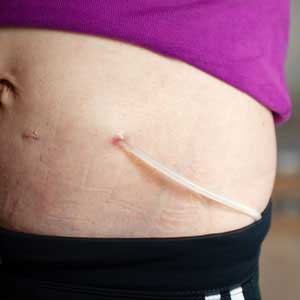Peritoneal dialysis in Vijayawada
Peritoneal dialysis in Vijayawada is a method to eliminate the waste products from your blood when your kidneys can't sufficiently finish the job anymore. This procedure filters the blood another way than does the more common blood-filtering procedure known as hemodialysis.
Consult Dr. Anvesh Golla who is the best Nephrologist in Vijayawada
During peritoneal dialysis:
- The dialysate flows into your abdomen and stays there for a prescribed timeframe — normally 4-6 hours
- Dextrose in the dialysate assists filter waste, chemicals and additional fluid in your blood from minuscule blood vessels in the lining of your abdominal cavity.
- When the stay time is finished, the solution — alongside with waste products drawn from your blood — drains into a sterile collection bag.

These treatments should be done at home, at work or while traveling. But peritoneal dialysis isn't a possibility for everybody with kidney failure. You really need manual dexterity and the capacity to really focus on yourself at home, or you need a reliable caregiver.
Why is it done?
You want dialysis if your kidneys are unable to work well. Kidney damage advances over number of years because of long haul conditions, for example,
- Diabetes
- Hypertension
- Kidney inflammation (glomerulonephritis)
- Multiple cysts in the kidneys (polycystic kidney disease)
What are the various types of peritoneal dialysis?
The major ones are:
- Continuous Ambulatory Peritoneal Dialysis (CAPD): With CAPD, you do the exchanges yourself 3-4 times a day.
- Continuous Cycling Peritoneal Dialysis (CCPD): With CCPD, a machine known as cycler does the exchanges automatically while you sleep. You may likewise need to do one exchange during the day if your kidney function reduces further.
How will you know how much dialysis is needed?
The amount of dialysis required is different for everybody. It depends on many factors, including your weight, how much kidney function you actually have, your overall wellbeing, and the aftereffects of your lab tests. Your doctor will give you a dialysis prescription that is designed only for you. Your prescription will tell you:
- The number of exchanges you need to make every day.
- How long the dialysis fluid necessities to remain in your belly
- What type and amount of dialysis fluid you want to use for each exchange.
Will you really want to follow a special diet?
Getting the right supplements and balancing fluids is as vital to your health as getting the right amount of dialysis. The dietitian at your dialysis center will assist you in planning your diet to ensure you get the right proportion of protein, calories and other significant supplements. You may likewise have to:
- limit how much sodium (salt) you eat
- take nutritional supplement
Contact Dr. Anvesh Golla for UTI Treatment In Vijayawada
